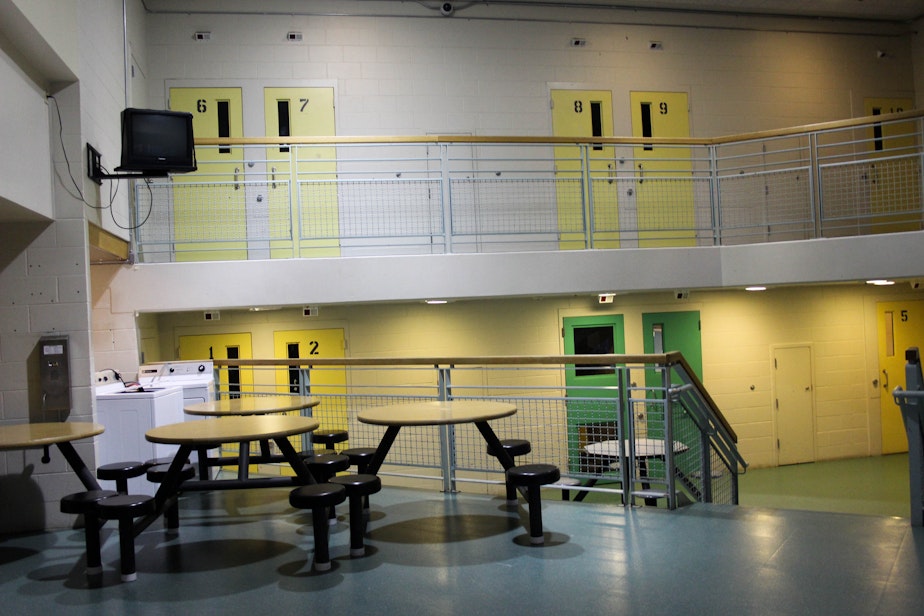King County wants no youth detention. So why is it building a new youth jail?

The excavation work for King County’s new youth jail is done. But with the building’s foundation soon to be laid on East Alder Street, a new report calls into question how the design aligns with the county and city’s stated goals of not jailing young people at all.
The report, from Dr. Eric Trupin at the University of Washington Medical School, evaluates the design, programming and staffing of the facility. Among the recommendations:
- Redesign the living spaces to be centered on responsibility, self-management and relationship building.
- Reduce the number of secure beds, currently at 112. Trupin says information from the county showed that in 2016, 57 beds were sufficient to meet the need.
- Add transitional/non-secure beds for homeless youth and those who need mental health placement.
- Eliminate the arrest of so-called status offenders – youth who run away from their foster home.
- Engage more community mentors who can connect with youth, even if they’ve previously been arrested. Figure out effective ways to engage immigrant and refugee communities.
Trupin’s report gives the most comprehensive look to date at youth detention in King County as well as recommendations to help the county detain fewer young people.
King County Executive Dow Constantine asked for Trupin’s recommendations in May — two months after announcing the county’s intent to move towards zero youth detention.
Sponsored
Three years too late
It’s been nearly six years since voters approved the $210 million rebuild, and even Constantine is sounding impatient.
In an interview last week, he cited the poor condition of the existing structure and groused that delays were getting costly. “The sooner we get it built, the sooner we're going to be able to provide more services to families and kids to deal with the challenges in their lives,” he said.
But when the report was released on Friday, his public reception of it seemed lukewarm. His office thanked Trupin for his work and focused on the road ahead.
"These recommendations provide important insights and highlight both short- and long-term opportunities to help youth and keep the entire community safe. I look forward to continuing the conversation as we develop new and innovative ways to ensure that all young people have the best chance to avoid the pitfalls of youth and the burden of history, and grow into healthy, responsible adults," Constantine said.
Sponsored
Constantine called the recommendations detailed and said it would take time to consider potential changes moving forward.
“We cannot simply decide that as of tomorrow we will have zero detention because we don't have the kinds of robust alternatives or community facilities and programs we would need to be able to take on those kids and keep them safe and keep the community safe,” Constantine said. He added that many of the report’s recommendations would need the cooperation of the King County prosecutor’s office.
Some of it may be an issue of timing.
Trupin said ideally the county would have come to him three years ago for his input. The report notes that with contracts already signed and construction imminent, there were “serious impediments for the feasibility of proposing significant changes.”
Trupin researched his report with extensive input from community groups, county staff, young people and advocates.
Sponsored
Trupin and other behavioral health experts have found that secure detention is only appropriate for the most serious offenses. For most young people the time they spend in confinement has a deleterious effect and can aggravate behavioral health conditions. Trupin’s report points out that the end result of separating young people from their family and community was often more engagement in the criminal justice system.
Some King County programs have shown positive impact. Nearly two years ago the county stopped detaining most young people accused of domestic violence against family members. Instead of being arrested and charged, the youth are provided housing in unlocked units. Both the youth and their family are provided support through Family Intervention and Restorative Services. According to the report, last year 500 domestic violence cases were referred to the program; in the end only 16 percent of the youth were charged.
The county has also set aside nearly $40 million for its Best Starts for Kids program designed to fund programs for kids from birth to age 24. But engaging young people in programs to help them has been tricky. Often they’re kids of color who feel disconnected from the process and end up filling the detention center and courthouses. Despite the county’s significant success at detaining fewer young people, efforts to stem the racial disproportionality have been slow.
To that end, more community members have stepped in to do the work. The Federal Way Youth Action team has been successful at running small outreach programs for youth, but so far, like a lot of community groups, funding has been difficult.
There is a sense from some doing this work that the county isn’t ready to put money into non-traditional solutions even though they seem to be working.

